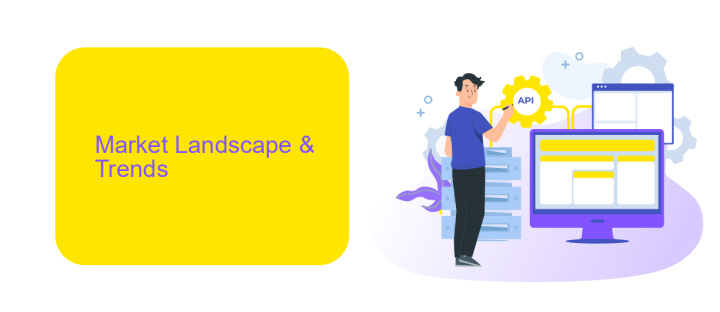Forrester No-Code Platforms
No-code platforms are revolutionizing the way businesses approach software development by enabling non-technical users to create applications without writing a single line of code. According to Forrester, these platforms are pivotal in accelerating digital transformation, enhancing productivity, and reducing development costs. This article delves into Forrester's insights on the growing impact and future potential of no-code platforms in the tech landscape.
Introduction & Definition
No-code platforms have revolutionized the way businesses approach software development, allowing users to create applications without writing a single line of code. These platforms democratize the development process, making it accessible to non-technical users and accelerating the time-to-market for new applications.
- Ease of use: Intuitive drag-and-drop interfaces.
- Cost-effective: Reduces the need for expensive developer resources.
- Rapid development: Speeds up the creation and deployment of applications.
- Flexibility: Adaptable to various business needs and industries.
One of the key advantages of no-code platforms is their ability to integrate with various services and tools seamlessly. For instance, ApiX-Drive offers robust integration capabilities, allowing businesses to connect different applications and automate workflows effortlessly. By leveraging such integrations, organizations can enhance their operational efficiency and focus on innovation rather than technical complexities.
Market Landscape & Trends

The no-code platform market is experiencing rapid growth as businesses seek to accelerate digital transformation and reduce dependency on traditional software development. These platforms empower users with little to no programming skills to create applications, automate workflows, and integrate various systems. Key players in the market are continuously innovating to offer more robust and user-friendly solutions, catering to a diverse range of industries and use cases.
One notable trend is the increasing demand for seamless integration capabilities. Services like ApiX-Drive play a crucial role in this landscape by enabling users to effortlessly connect different applications and automate data flows. This not only enhances operational efficiency but also allows businesses to quickly adapt to changing market requirements. As the no-code ecosystem evolves, we can expect further advancements in integration technologies, making it even easier for organizations to build comprehensive, interconnected digital solutions.
Vendor Landscape & Analysis

The vendor landscape for no-code platforms is diverse, featuring a variety of tools that cater to different business needs. These platforms empower users to create applications without traditional coding, making technology more accessible to non-developers. Key players in this space include industry giants and emerging startups, each offering unique features and capabilities.
- OutSystems: Known for its robust enterprise solutions and extensive integration capabilities.
- Mendix: Offers a comprehensive suite for rapid application development and deployment.
- AppSheet: Google’s no-code platform that excels in creating mobile and web apps from data sources.
- ApiX-Drive: Specializes in seamless integration of various services, enabling businesses to automate workflows effortlessly.
- Bubble: Popular for its flexibility and powerful customization options.
As the demand for no-code solutions grows, the competitive landscape is expected to evolve rapidly. Vendors like ApiX-Drive play a crucial role by providing integration services that enhance the functionality of no-code platforms. This allows businesses to streamline processes and improve efficiency without the need for extensive coding knowledge.
Benefits & Use Cases

No-code platforms offer a myriad of benefits, making them an increasingly popular choice for businesses of all sizes. One of the primary advantages is the significant reduction in development time and costs, as these platforms eliminate the need for extensive coding knowledge. This allows companies to quickly bring their ideas to life and adapt to market changes with greater agility.
Furthermore, no-code platforms empower non-technical users to participate in the development process, fostering a culture of innovation and collaboration within organizations. By democratizing application development, these platforms enable employees from various departments to create and modify applications tailored to their specific needs.
- Rapid prototyping and deployment
- Cost-effective solutions
- Enhanced collaboration across teams
- Easy integration with existing systems
One notable use case is the integration of various business tools and services. Platforms like ApiX-Drive facilitate seamless connections between different applications, automating workflows and enhancing productivity. By leveraging no-code platforms, companies can streamline their operations, reduce manual tasks, and focus on strategic initiatives that drive growth.
Challenges & Considerations
While no-code platforms offer significant advantages, they also present certain challenges and considerations. One primary concern is the potential for limited customization. Although these platforms provide a wide range of pre-built components, they may not always meet specific business needs, leading to constraints in functionality and design. Additionally, security and compliance can be areas of concern, as no-code solutions might not offer the same level of control and scrutiny as traditional coding environments.
Another challenge is the integration of no-code platforms with existing systems and workflows. Ensuring seamless data flow between various applications can be complex. Services like ApiX-Drive can be invaluable in this context, offering robust tools to automate and streamline integrations. However, users must still invest time in understanding these tools to maximize their effectiveness. Finally, while no-code platforms empower non-technical users, there is a risk of creating shadow IT, where applications are developed outside the purview of the IT department, potentially leading to governance issues.
FAQ
What is a No-Code Platform?
How do No-Code Platforms benefit businesses?
Can No-Code Platforms handle complex integrations and automations?
Are No-Code Platforms secure?
What types of applications can be built using No-Code Platforms?
Apix-Drive is a universal tool that will quickly streamline any workflow, freeing you from routine and possible financial losses. Try ApiX-Drive in action and see how useful it is for you personally. In the meantime, when you are setting up connections between systems, think about where you are investing your free time, because now you will have much more of it.

